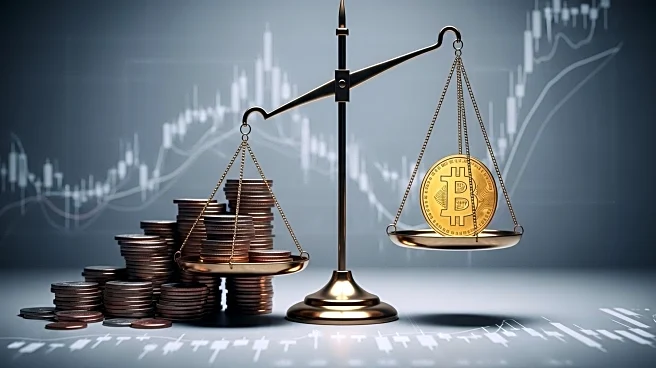What is the story about?
What's Happening?
The stock market has increasingly become a platform for speculative trading, driven by the allure of quick profits through commission-free trading apps and social media influence. This trend has attracted millions of retail investors, transforming the market into what some describe as a 'slot machine.' The phenomenon is characterized by short-term price movements and emotional trading, overshadowing traditional investment strategies based on fundamental analysis. The rise of meme stocks and zero-days-to-expiration (0DTE) options has further fueled this speculative environment, with retail investors accounting for a significant portion of daily U.S. equity trading volume. This shift has profound implications for both individual investors and the broader market ecosystem.
Why It's Important?
The surge in speculative trading poses significant risks to both individual investors and the market at large. Retail investors, often driven by fear of missing out and herd mentality, may face substantial financial losses due to the hidden costs of speculative trading, such as wide bid-ask spreads and short-term capital gains taxes. The broader market is affected by increased volatility and a decoupling of stock prices from company fundamentals, complicating investment strategies for institutional investors. Companies targeted by speculative trading may experience temporary stock price surges, but these are often followed by sharp corrections, impacting their long-term financial stability. The trend also raises regulatory concerns, prompting scrutiny from bodies like the U.S. Securities and Exchange Commission (SEC) regarding practices such as Payment for Order Flow (PFOF) and the gamification of trading apps.
What's Next?
The continuation of speculative trading is likely, with retail investor activity remaining high and accessible trading platforms proliferating. This environment will present opportunities for traders who can navigate rapid price movements, but also challenges for those who misjudge market sentiment. Regulatory bodies may increase oversight to protect investors, potentially leading to stricter disclosure requirements and limitations on high-risk products. Investors will need to focus on fundamental analysis and diversification to mitigate risks. The market may experience further volatility, with potential corrections as speculative bubbles burst, impacting broader market stability.
Beyond the Headlines
The speculative trading trend highlights a broader shift in market dynamics, driven by the democratization of finance and the rise of digitally empowered retail investors. This shift has led to increased market volatility and challenges for traditional investment strategies. The trend also underscores the need for regulatory adaptation to balance market accessibility with investor protection. The long-term impact will depend on how effectively investors and regulators address the risks associated with speculative trading, ensuring the integrity of the financial system while fostering innovation.















